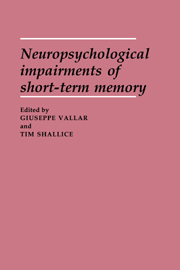Book contents
- Frontmatter
- Contents
- List of contributors
- Acknowledgments
- General introduction
- I THE FUNCTIONAL ARCHITECTURE OF AUDITORY–VERBAL (PHONOLOGICAL) SHORT-TERM MEMORY AND ITS NEURAL CORRELATES
- II PHONOLOGICAL SHORT-TERM MEMORY AND OTHER LEVELS OF INFORMATION PROCESSING: STUDIES IN BRAIN-DAMAGED PATIENTS WITH DEFECTIVE PHONOLOGICAL MEMORY
- III SHORT-TERM MEMORY STUDIES IN DIFFERENT POPULATIONS (CHILDREN, ELDERLY, AMNESICS) AND OF DIFFERENT SHORT-TERM MEMORY SYSTEMS
- IV PHONOLOGICAL SHORT-TERM MEMORY AND SENTENCE COMPREHENSION
- Name index
- Subject index
I - THE FUNCTIONAL ARCHITECTURE OF AUDITORY–VERBAL (PHONOLOGICAL) SHORT-TERM MEMORY AND ITS NEURAL CORRELATES
Published online by Cambridge University Press: 11 May 2010
- Frontmatter
- Contents
- List of contributors
- Acknowledgments
- General introduction
- I THE FUNCTIONAL ARCHITECTURE OF AUDITORY–VERBAL (PHONOLOGICAL) SHORT-TERM MEMORY AND ITS NEURAL CORRELATES
- II PHONOLOGICAL SHORT-TERM MEMORY AND OTHER LEVELS OF INFORMATION PROCESSING: STUDIES IN BRAIN-DAMAGED PATIENTS WITH DEFECTIVE PHONOLOGICAL MEMORY
- III SHORT-TERM MEMORY STUDIES IN DIFFERENT POPULATIONS (CHILDREN, ELDERLY, AMNESICS) AND OF DIFFERENT SHORT-TERM MEMORY SYSTEMS
- IV PHONOLOGICAL SHORT-TERM MEMORY AND SENTENCE COMPREHENSION
- Name index
- Subject index
Summary
The first part of the book comprises four chapters that discuss two main issues: (a) the possible functional architecture of the system(s) involved in the short-term retention of verbal material (Shallice & Vallar, chapter 1; Baddeley, chapter 2; Friedrich, chapter 3); and (b) some neural correlates (chapter 1; Starr, Barrett Pratt, Michalewski, & Patterson, chapter 4).
Two main approaches are suggested on the functional structure of verbal short-term memory. Shallice and Vallar and Baddeley take the view of verbal short-term memory as a multicomponent system, which includes a number of distinct processing and storage subcomponents. Shallice and Vallar review the neuropsychological and, more briefly, the normal evidence for this approach. They consider a number of specific phenomena, such as auditory–verbal memory span and the recency effect in free and serial recall, noting a convergence in the findings obtained from normal subjects and patients. They note that a number of aspects of the original observations (Warrington & Shallice, 1969) of a selective impairment on span tasks have been replicated in a considerable number of cases, which they review. The evidence from normal subjects supports the position that short-term memory effects from paradigms such as span reflect the operation of a buffer store where information is coded phonologically. The results obtained from the patients are very similar to what would be expected if such a component were severely damaged. On the basis of this type of argument, Shallice and Vallar suggest that the selective deficit of auditory-verbal span may be conceived as a functional syndrome, which may be traced back to the selective impairment of a specific component of verbal short-term memory.
- Type
- Chapter
- Information
- Neuropsychological Impairments of Short-Term Memory , pp. 7 - 10Publisher: Cambridge University PressPrint publication year: 1990



